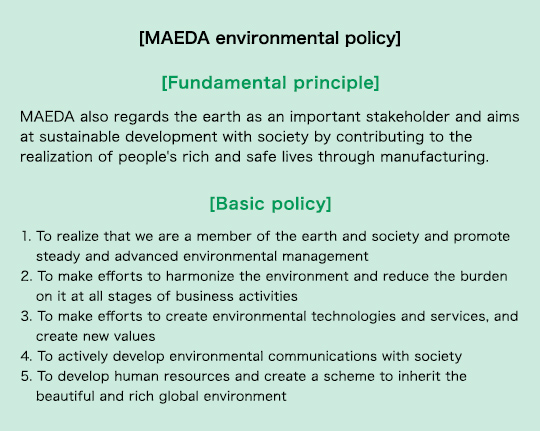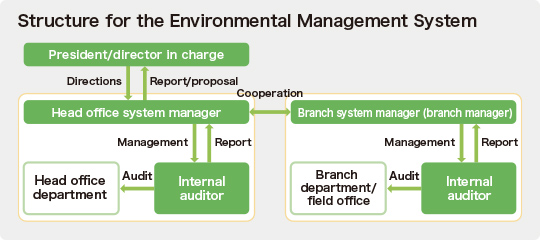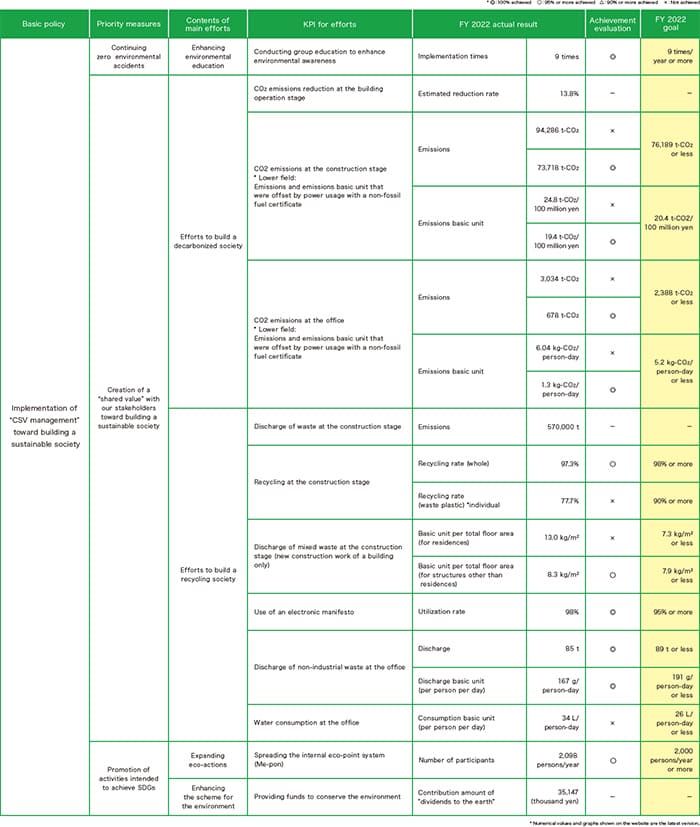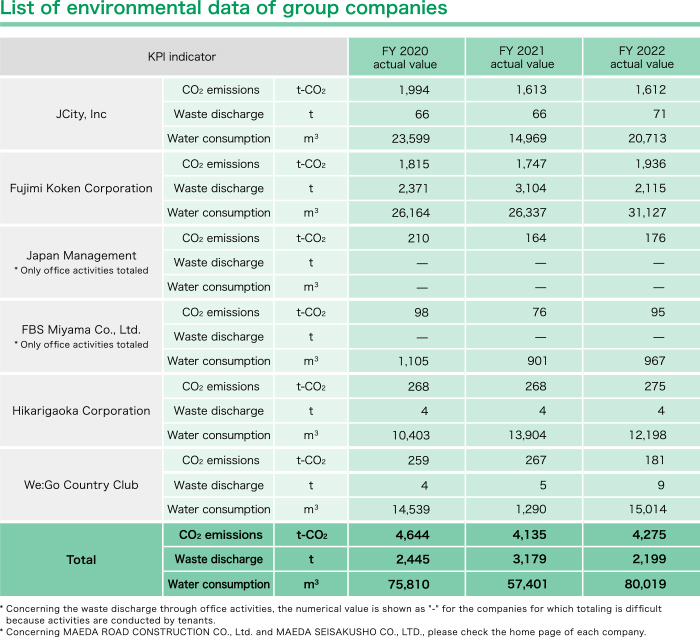Promoting environmental management
Our company is striving with all our resources to work on environmental conservation activities, with the fundamental principle that "MAEDA also regards the earth as an important stakeholder and aims at sustainable development with society by contributing to the realization of people's rich and safe lives through manufacturing," in the MAEDA environmental policy.
Policy/view
Our company supports the fundamental principle of "aiming at sustainable development with society," in the MAEDA environmental policy.
A constructor, which is an industry that accepts an order, must aim to realize a recycling society to fulfill its duties with many stakeholders, such as material manufacturers, cooperative companies, private enterprises (customers), and public administration. For that reason, stipulating the scheme to provide products with lower burden on the environment in the management system (hereinafter referred to as "MS") from the planning/operation stage, our company specifies the mid-term environmental goal considering the long-term goal for emissions reduction, and the plan to put it into effect.
The mid-term environmental plan specifies the basic policy and priority measures, as well as deployment items to be carried out by each department to put it into effect. A new three-year mid-term environmental plan was started in FY2019. With “implementation of ‘CSV management’ aimed at building a sustainable society” considered as our basic policy, we intend to pursue “strengthening of the cooperation with our stakeholders,” “achievement of both productivity improvement and environmental burden reduction,” and “substantiation of a decarbonization scenario aimed at realizing CSV management.”
However, various issues to be addressed, such as simultaneously achieving “green recovery” from COVID-19, disaster preventive infrastructure development, and productivity improvement by digital transformation (DX), have started to emerge. Environmental Management has faced a paradigm shift, for which previous efforts have been discontinued, and measures against climate change are now set as the core.
In FY 2020, following the government’s “2050 Carbon Neutral Declaration,” our company also revised the CO2 reduction target to “net zero by 2050.” When the holding company system was adopted in FY 2021, the reduction target for FY 2030 was also reviewed. We will continue to pursue solutions to social problems while taking advantage of the Group’s synergy, in addition to conducting financial analysis of the environmental risks and opportunities for individual businesses by strengthening the Group’s governance.

Environmental Management System
Our company obtained the IS014001 certification for the company-wide unified environment management system (hereinafter referred to as "EMS") in 2001. The certification covers all offices in Japan, including field offices. To seek further unification of business activities and MS, triggered by the revision of the ISO standard, 2015 edition, on April 1, 2017, the "Rules for quality and environment," in which EMS and QMS were integrated, were established, and their operation was started. A transition examination was performed in September 2017, and for both MSs, the transition to the 2015 version was completed.
An internal system audit of FY 2022 was conducted at 158 field offices. There were no nonconformities related to EMS, and 49 observed matters. Also, in the FY 2022 external examination (EMS/QMS integrated examination), the head office and nine branch offices (including business offices and field offices) took the examination. The result was zero non-conformance for which a corrective action related to EMS is required and 14 observations (2 of which are in common with QMS) (indicated as necessary for some improvement and as unnecessary for a response report).
There were no serious environmental accidents in FY 2022. In the management review, the strengthening of response to SCOPE 3 was indicated. For legal responses, since systematization beyond an individual company’s limit is desired, the response in cooperation with industry organizations is also in progress.

Goal and result
For the enhancement of environmental education, to fully execute group education and EMS education for employees in their first, third, and fifth year, the implementation times are set as an indicator. To seek to improve the understanding of law revisions and internal rules that are revised to respond to such revisions, we convey information such as that on law revisions through environmental newsletters, and conduct a “test to check the understanding of safety and environment” through e-learning for employees at departments related to work execution in field offices and branches.
Efforts at field offices intended to respond to climate change and construct a recycling-based society are registered in the environmental portal site. The person in-charge at each branch checks the state of the activity, and the obtained data are aggregated and published as environmental values. In addition, the results of environmental efforts are among the evaluation items under examination for our internal commendation “Environmental Activity Award.” In the office sector, waste, water consumption, and CO2 emissions per person are measured, and waste and water are items to be monitored. The CO2 emissions from construction activities have also been offset with a non-fossil fuel certificate since FY2022. It is necessary to manage the items to be monitored in both construction and office activities as before.

